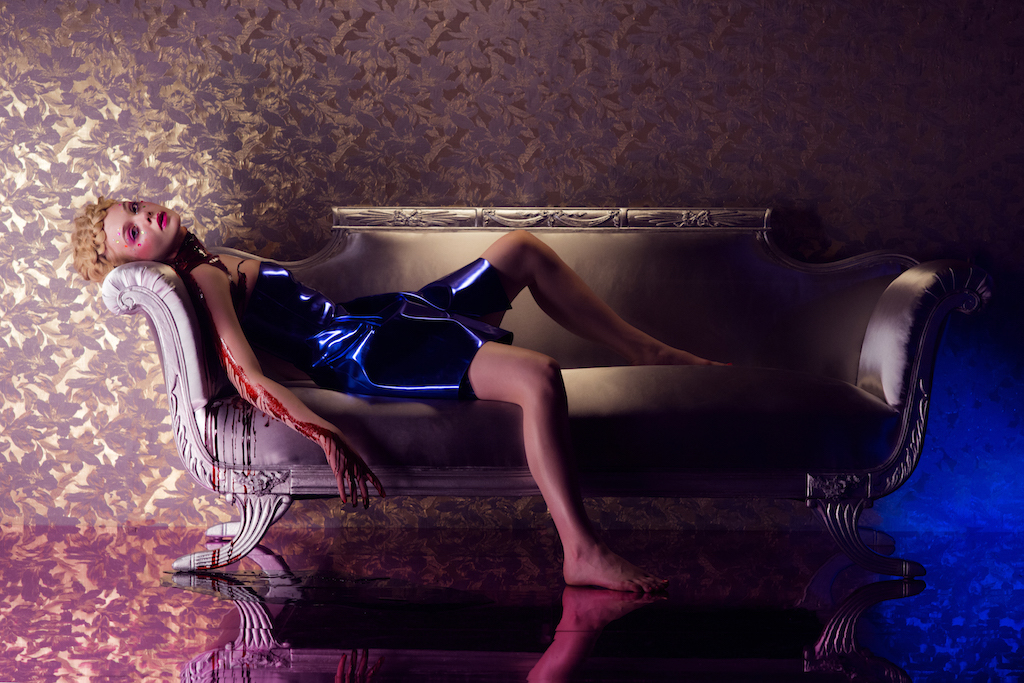
I’d say that Nicolas Winding Refn’s The Neon Demon feels like a cross between a David Lynch film, a Calvin Klein ad, and Bret Easton Ellis novel, but that makes it sound way cooler than it actually is. Indeed, it does feature Lynch’s sense of meticulously designed surrealist dread, the dead-eyed models of a Calvin Klein ad, and the “L.A. is a soul-sucking wasteland” ethos of Ellis’s work. And yet, somehow, the whole doesn’t quite equal the sum of its parts. Or, more accurately, its parts don’t feel particularly unique. And, as the film lingers on a series of whip-thin young beauties who glower meaningfully at the camera, it feels more than a wee bit indulgent.
The story focuses on 16-year-old Jesse (Elle Fanning), a girl with no family (or so she says) who moves to L.A. to become a model. The first scene shows Jesse reposed on one of the film’s ubiquitous velvet divans, covered in blood. Briefly, we think she might be dead, but then the film pans back to the photographer—it’s a photo shoot (and foreshadowing!). The irony of this highly art directed, morbid shoot is that the photographer (Karl Glusman) is one of the film’s few true innocents—a young man who recently took a liking to Jesse and wants nothing more than to be her boyfriend. I’m not one to demand realism in my artsy horror films, but why exactly would this sweet young man be staging such an aesthetically gory scene, especially for a girl who simply asked for some headshots to launch her modeling career? (And how could he afford the set?).
Turns out, Jesse has a profound affect on people: The photographers, agents, and fashion designers are instantly besotted by her, apparently drawn to her unfettered beauty and bewitching youth and naiveté. The other models—one, played by Bella Healthcote, boasts about having had extensive plastic surgery to conform to an impossible ideal—are profoundly jealous of her, covetous of what she has. A seemingly kindly make-up artist, Ruby (Jenna Malone), takes Jesse under her wing, but does she have ulterior motives?
At the 1970s motel where Jesse lives (her room it has wonderfully saturated and mismatched wallpaper and bedspreads and looks like something out of a W fashion spread, naturally) there’s a predatory manager (Keanu Reeves, against type), an even younger aspiring starlet a few doors down, and a mountain lion that pays a (symbolic!) visit.
The Neon Demon moves languorously, lingering over every frame, thus imbuing each image with a false sense of significance. There is, indeed, some wonderful art direction here. But watching Jesse stare in the mirror for the umpteenth time or repose with glamorous ennui on one of those divans, I found myself rolling my eyes. Imagine a female director lavishing such explicitly erotic attention on beautiful young men for an entire film, all to make the point that beauty is worshiped because it’s the opposite of decay and death. (“But the film isn’t superficial, it’s about superficiality!” Refn would undoubtedly protest. Cool story, bro.)
As for Jesse, she’s not that innocent, as it turns out. She loves the affect her beauty has on people, gets empowered by it (and seduced by the “neon demon”—a beckoning light on the runway representing the intoxicating effects of narcissism). By the end of The Neon Demon, the film’s obsession with blood and rot and the ephemeral nature of beauty all come to its inevitable conclusion. It’s true what they say: Hollywood eats its young.
